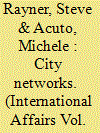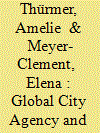| Srl | Item |
| 1 |
ID:
193825


|
|
|
|
|
| Summary/Abstract |
The transnational rise of city networks is increasingly associated with the emergence of hybrid configurations beyond the public sector that contribute to technocratic decisionmaking processes and the depoliticization of global governance. This article takes issue with this argument. By analyzing the legitimation strategy used by the global city network United Cities and Local Governments (UCLG) vis-à-vis the UN system, the article contends that city networks can generate collective agency and frame political issues as a matter of public accountability. The cities gathered under UCLG, a “public membership” city network, are offering their political constitution to the multilateral system, thus complementing rather than replacing the political agency of state-centric processes. Yet the state-centric nature of the international system is also the main obstacle on the (winding) road of UCLG toward multilateral recognition.
|
|
|
|
|
|
|
|
|
|
|
|
|
|
|
|
| 2 |
ID:
148458


|
|
|
|
|
| Summary/Abstract |
There is today a global recognition that we live in an ‘urban age’ of near-planetary urbanization where cities are at the forefront of all sorts of agendas. Yet little attention is offered to the active role of cities as political drivers of the urban age. There might today be more than two hundred ‘city networks’ globally, with thousands of para-diplomatic connections actively defining relations between cities, international organization and corporate actors. This actively networked texture of the urban age shapes all areas of policy and, not least, international relations, and holds much promise as to possible urban solutions to global challenges. Based on an overview of a representative subset of this mass of city-to-city cooperation (n=170), this article illustrates the landscape of city networking, its issue areas and institutional shapes, and its critical features. As we argue, city networks today are faced by a crucial challenge: while trying to overcome state-centric ‘gridlocks’ cities are, at the same time, building both political–economic as well as very material ‘lock-ins’. We need to pay serious attention to this impact of city diplomacy in international affairs, developing a greater appreciation of the path dependencies and responsibilities this diplomatic activity purports.
|
|
|
|
|
|
|
|
|
|
|
|
|
|
|
|
| 3 |
ID:
184095


|
|
|
|
|
| Summary/Abstract |
Over the past few decades, cities have become increasingly active in global climate governance. Although most research on city agency has focused on democratic (often Western) cities, the climate-related activities of Chinese cities in global city networks have also expanded, raising the question of whether cities from nondemocratic political systems can be international actors or whether they are merely extensions of their national governments. This article examines how the Chinese Party-state’s institutions and governing instruments shape cities’ global agency and how these structures impact the work of various city networks operating in China. To this end, it analyzes policy reports, documents, and original interview data collected from city network representatives. The findings demonstrate that city networks in China walk a fine line between their door-opening function for cities to global climate governance and their role as transmitters of the central government’s gatekeeping function, thereby sustaining the hierarchical control structures of the Chinese Party-state.
|
|
|
|
|
|
|
|
|
|
|
|
|
|
|
|